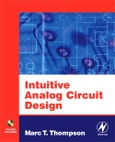Table of Contents
Introduction and motivation; Bode plots, Review of pole-zero plots, Second-order systems, Relationship between bandwidth and risetime; Bipolar device models; Review of feedback systems; Bandwidth estimation techniques; Transistor switching and switching speed estimation; Transistor extended models; CMOS amplifiers; Advanced transistor amplifier design techniques; Operational amplifier topologies; Real-world op-amps; Operational amplifier circuit potpourri; Analog filtering; PC board layout; Impedance of a PC board trace, Power supply bypassing; Passive components; Mechanical circuit analogies, Thermal circuits, Magnetic circuitsAuthors
Marc Thompson Thompson Consulting, Inc. MA, USA.Worcester Polytechnic Institute, MA, USA..
Dr. Thompson specializes in custom R/D, analysis, and failure investigations into multi-disciplinary electrical, magnetic, electromechanical and electronic systems at Thompson Consulting, Inc. (Harvard MA).
The author is also Teaching Professor of Electrical and Computer Engineering at Worcester Polytechnic Institute. He teaches graduate-level and undergraduate seminars in analog, power quality, power electronics, electomechanics, electric motors, rotating machinery, and power distribution for high-tech companies. He has taught for University of Wisconsin-Madison, covering classes in electric motors, electromechanical systems, power electronics and magnetic design.








